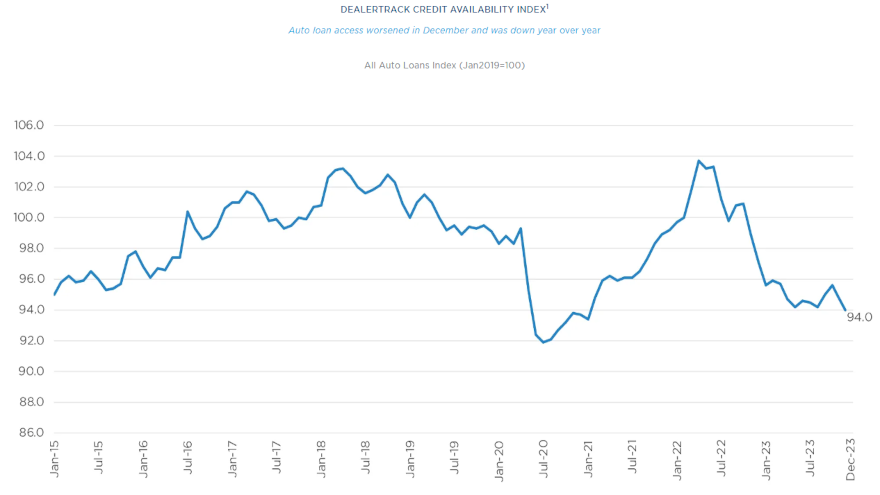Credit availability closes 2023 on notable slide

Chart courtesy of Cox Automotive.
By subscribing, you agree to receive communications from Auto Remarketing and our partners in accordance with our Privacy Policy. We may share your information with select partners and sponsors who may contact you about their products and services. You may unsubscribe at any time.
Evidently finance companies weren’t in much of a giving mood this holiday season since credit availability deteriorated in December, according to the Dealertrack Auto Credit Availability Index.
Cox Automotive reported that index declined in November and dropped another 0.9% to 94.0 in December, reaching its lowest level since May and “erasing improvements made in the summer and fall.”
Analysts pointed out that credit availability was tighter year-over-year, too. And compared to February 2020, only credit availability at independent dealers and from auto finance companies that often specialize in the subprime space was looser compared to December, according to Cox Automotive.
“Movement in credit availability factors mostly moved against consumers in December,” analysts said in their index update. “Yield spreads widened, term length declined, and the negative equity share declined, and those moves reduced credit access for consumers. Increases in the approval rate and the subprime share represented the only improvements for consumers.
“The down payment share was unchanged but at the highest level in the history of the data series,” Cox Automotive continued.
Analysts explained the average yield spread on auto financing booked in December widened by 28 basis points, “so rates consumers saw on auto loans were less attractive in December relative to bond yields.”
Subscribe to Auto Remarketing to stay informed and stay ahead.
By subscribing, you agree to receive communications from Auto Remarketing and our partners in accordance with our Privacy Policy. We may share your information with select partners and sponsors who may contact you about their products and services. You may unsubscribe at any time.
Cox Automotive recapped that the average auto finance rate attached to December paper decreased by 20 basis points compared to October, while the five-year U.S. Treasury note increased by 48 basis points, resulting in a wider average observed yield spread.
While the contract approval rate increased by 4 basis points in December, Cox Automotive acknowledged the reading softened 0.7 percentage points year-over-year.
Analysts added the subprime share decreased from 11.5% in November to 11.2% in December, ticking 0.9 percentage points lower compared to a year ago.
And the share of contracts with terms longer than 72 months decreased by 5 basis points sequentially 1.5 percentage points year-over-year, according to Cox Automotive tracking.
“On a year-over-year basis, credit access was tighter across all lender types, with auto-focused finance companies tightening the least while credit unions tightening the most,” analysts said.
Each Dealertrack Auto Credit Index tracks shifts in approval rates, subprime share, yield spreads and contract details, including term length, negative equity and down payments. The index is baselined to January 2019 to show how credit access shifts over time.


